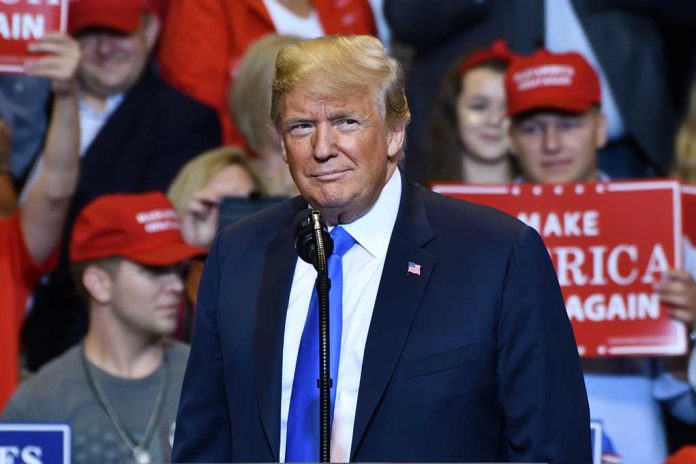
President Donald Trump has sparked constitutional controversy by expressing interest in a third presidential term despite the 22nd Amendment’s two-term limit, claiming there are “methods” to achieve this unprecedented goal.
Key Takeaways
- Trump told NBC News he’s “not joking” about seeking a third presidential term, suggesting there are legal methods to circumvent the 22nd Amendment’s two-term limit.
- Constitutional experts note that serving a third term would require either amending the Constitution (needing two-thirds majority in Congress) or complex legal maneuvers involving his running mate.
- A scenario proposed by legal scholars involves J.D. Vance running for president with Trump as VP, followed by Vance’s resignation after victory.
- Trump cites strong poll numbers and supporter enthusiasm as justification, though legal experts question the feasibility of overcoming constitutional barriers.
- Similar comments about extending presidential terms have been made previously by Trump, often dismissed as political rhetoric rather than serious policy positions.
Trump’s Claims About a Third Term
In a recent interview with NBC News, President Donald Trump made headlines by suggesting he might seek a third presidential term, despite constitutional restrictions. “I’m not joking,” Trump stated firmly when discussing the possibility of extending his presidency beyond the two-term limit established by the 22nd Amendment. This amendment, ratified in 1951 following Franklin Roosevelt’s unprecedented four-term presidency, explicitly states that “no person shall be elected to the office of the President more than twice.”
Trump claimed significant public support exists for the idea, stating, “A lot of people want me to do it.” He further asserted that “there are methods which you could do it,” though he stopped short of specifying exactly what legal avenues he believes might allow circumvention of the constitutional barrier. The president pointed to his poll numbers as evidence of his continued popularity and suggested this public backing could provide the momentum needed for such an unprecedented move.
🚨 BREAKING: President Donald Trump on serving a 3rd term as president
“A lot of people want me to do it."
“I’m not joking,” Trump said, when asked to clarify [NBC interview]. “But I’m not — it is far too early to think about it.”
“There are methods which you could do it.” pic.twitter.com/O6kyOfuaNL
— Eric Daugherty (@EricLDaugh) March 30, 2025
Constitutional Hurdles and Legal Perspectives
Legal experts have been quick to point out the significant constitutional barriers to Trump’s suggestion. The 22nd Amendment creates a clear two-term limit that would require substantial legal or political maneuvering to overcome. Jeremy Paul, a constitutional scholar, stated bluntly, “There are no credible legal arguments for him to run for a third term.” Amending the Constitution would require approval from two-thirds of both houses of Congress and ratification by three-fourths of state legislatures – a politically daunting task in today’s polarized environment.
Some legal scholars have outlined theoretical scenarios involving Trump’s running mate, J.D. Vance. Law professor Stephen Gillers described one such potential strategy, “Trump can be nominated as vice president with Vance nominated to be president. If the Vance-Trump ticket wins, Vance resigns and Trump becomes president. He then chooses Vance to be his vice president. The Senate would have to confirm Vance,” explained Gillers. However, Gillers also acknowledged potential constitutional problems with this approach, citing the 12th Amendment’s stipulation that no person ineligible for the presidency can serve as vice president.
Historical Context and Political Reactions
This is not the first time Trump has suggested serving beyond the constitutionally mandated two terms. Throughout his presidency and afterward, he occasionally made similar comments, though they were often dismissed as jokes or political rhetoric rather than serious policy positions. Rep. Andy Ogles has proposed a resolution to extend presidential term limits, potentially creating a path for Trump’s continued leadership, though such proposals face significant hurdles in Congress.
The White House responded to Trump’s comments by posting an image of him wearing a crown, referencing his remarks comparing himself to royalty. Democratic Rep. Daniel Goldman criticized Trump’s ambitions, urging Republicans to oppose what he characterized as an attempt to undermine constitutional norms. Former Trump strategist Steve Bannon has publicly supported the idea of Trump seeking additional terms, suggesting there is at least some backing within Trump’s inner circle for exploring these constitutional boundaries.
While the debate continues, Trump maintains he is currently focused on his campaign for a second term and has not made any official decision about pursuing a third. Constitutional scholars and political analysts agree that regardless of Trump’s intentions, any attempt to serve a third presidential term would face unprecedented legal challenges and would fundamentally test the nation’s constitutional framework.
Sources:
Trump says he’s looking for ways to serve a third term as president
Donald Trump’s Pathways to a Third Term



